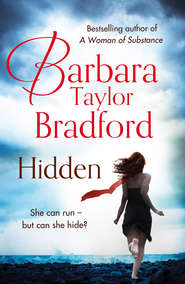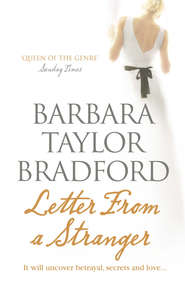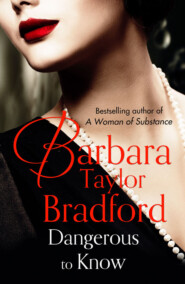По всем вопросам обращайтесь на: info@litportal.ru
(©) 2003-2025.
✖
The Emma Harte 7-Book Collection: A Woman of Substance, Hold the Dream, To Be the Best, Emma’s Secret, Unexpected Blessings, Just Rewards, Breaking the Rules
Настройки чтения
Размер шрифта
Высота строк
Поля
‘Well – all right,’ said Adele reluctantly, somewhat pacified, although still pouting.
Emma smiled confidently. ‘I’ll pop it back in the wardrobe for now. Don’t worry, Mrs Fairley, yer’ll look luvely tonight, yer will that. I promise. Now I’ll go and draw yer bath for yer, ma’am.’
‘Thank you, Emma,’ said Adele dully, still worrying about the dinner. Emma returned the gown to the wardrobe and hurried into the bathroom.
Adele went to her dressing table and took out the red velvet case that contained her diamond necklace, bracelets, and matching earrings. She lifted out the necklace and held it up to her throat. Its shimmering brilliance caused her to draw in her breath in surprise. She had forgotten how magnificent it was and, now that she thought about it, the black velvet gown would set it off perfectly. Perhaps Emma had been right, after all, in her choice. Adele smiled with delight. She would look so ravishing tonight even Adam would be speechless.
CHAPTER FIFTEEN (#ulink_551fd289-7755-59b8-8395-ab12659e8d19)
Later that day, when Emma finished her general chores, she returned to the upstairs sitting room with afternoon tea for Adele Fairley. Adele had declined to come down for lunch, claiming a headache and fatigue, and so Emma had taken great care with the tea, being determined to make Mrs Fairley eat something to keep up her strength for the important evening that lay ahead. Having overheard the conversation between Adele and Adam, and later witnessing Adele’s concern over her gown, Emma had intuitively sensed her apprehension about the dinner party. She felt protective of Adele, now that her sympathetic feelings were restored, and she wanted to assuage Adele’s nervousness as best she could. Pampering her a little was the only way Emma knew how to do this.
For these reasons, even though she was more overworked than usual because of the dinner party, Emma had painstakingly prepared some of the things Adele enjoyed for tea, hoping to tempt her jaded appetite. There were tiny cucumber sandwiches and others filled with egg, cream crackers spread with shrimp paste, hot buttered scones, home-made cherry jam, Cook’s delicious shortbread biscuits and Eccles cakes. She had also made a huge pot of the tea Mrs Fairley preferred, although Emma didn’t know how she could drink it. To Emma it tasted funny, like smokey water, and not at all like real tea, even if it was expensive and was specially ordered from Fortnum and Mason in London. But there was no accounting for the tastes of the rich, Emma decided, as she trudged up the staircase with the tea tray. They ate and drank the strangest things, to her way of thinking. She liked good plain food herself, and didn’t hold with fancy dishes and rich sauces and peculiar delicacies, which never tempted her. She also believed the gentry ate too many meals with too many courses. To Emma it was disgusting the way they gorged themselves gluttonously like ravenous pigs. No wonder they suffered from indigestion and were liverish and bad-tempered. It was all that food and drink that did it. Even when I make me fortune, I’ll still eat simple, she commented to herself as she went into Mrs Fairley’s rooms.
Adele had been resting all afternoon. She was still lying in the great fourposter bed, propped up against the pile of pale green pillows, reading the Yorkshire Morning Gazette, when Emma entered the room and carried the tray over to the bed. Adele looked up from the newspaper and smiled sweetly.
‘I’m glad you suggested I take a rest,’ said Adele, adjusting her position against the pillows. ‘I slept for quite a long time and I do feel more rested and refreshed for tonight, just as you said I would, Emma.’ She smiled again and there was a hint of gratitude in her eyes.
Emma stared at Adele intently. The tense lines that had etched her mouth with anxiousness that morning had vanished. Her face was relaxed and calm, and her eyes were so clear and bright they were almost merry. Even the badly swollen lids had lost their red puffiness and the deathly pallor had been replaced by a delicate glow that perfectly reflected the pale pink satin nightgown she wore.
Why, she looks ever so beautiful, Emma thought, and said, ‘I’ve brought yer summat ter eat, Mrs Fairley. Yer must be right famished, seeing as how yer didn’t have owt since breakfast. Try and get summat down yer, even if it’s only a few mouthfuls.’ She placed the tray next to Adele on the bed and continued, ‘I even made that funny tea yer like.’
Adele laughed and for once there was gaiety in her voice. ‘You mean the Lapsang Souchong, Emma. Thank you.’
‘Yes, that’s it. Lapsang Souchong—’ Emma repeated slowly, and hesitated. Then she said questioningly, ‘Do I say it proper like, ma’am?’
‘You do indeed,’ asserted Adele, somewhat amused, as she poured a cup for herself.
Emma smiled slightly. She liked to learn things, for future reference. She would need to know a lot when she went to Leeds to make her fortune. Now she cleared her throat and said, ‘Begging yer pardon, Mrs Fairley, but I’d like ter look at yer dress again, if yer don’t mind. I wants ter be sure that there’s nowt wrong with it. That there’s nowt that needs fixing. I wants it ter be perfect for the dinner. Will I be in yer way?’
‘Of course not, Emma. And if it does need anything done to it, you may stay here and work. You don’t have to go up to your room. But I’m sure it’s not damaged. I’ve hardly worn it, you know,’ said Adele.
Whilst Adele had her tea, Emma took out the black velvet gown and examined it minutely for any defects. It was in beautiful condition, except for a loose hook and a few torn stitches on the hemline of the train where Mrs Fairley had obviously caught her heel. Emma also noticed there were lots of dangling threads visible down the side of the gown, where she had cut off the roses. She would have to pull the threads out gently, she realized, in order not to damage the expensive black velvet.
Emma carried the gown to the chaise and began to work on it with great care, for she was a perfectionist and gave every task her undivided attention. She was glad to sit down for a while. She had been run off her feet all day and she was facing a long and arduous evening, since she was to help Murgatroyd serve the dinner. She relaxed as she worked and the tiredness she had been experiencing earlier gradually began to evaporate.
A certain kind of compatibility had developed between Emma and Mrs Fairley in the last few months. Disparate as they were in background and age, they were curiously at ease with each other, and although this understanding was unexpressed, it was, none the less, valid. The girl intuitively sensed the older woman’s terrible anguish, and despite her youth and inexperience, she recognized the tragedy of Adele’s life. Quite automatically and without much forethought, Emma knew how to behave properly around her and without underscoring or feeding Adele’s extreme anxiety in any way. On her part, Adele had grown to like Emma, whom she found patient, kind, and unobtrusive when she worked in the suite of rooms. Adele also thought Emma was pretty and this pleased her, for she could not abide ugliness. And so an aura of peace enveloped them as they sat together in the room, the young girl passively sewing, the older woman partaking of her afternoon tea.
The bedroom was filled with the mellowest of lights that flooded through the tall windows, and the fire crackled and blazed in the grate, giving off a cheery glow that was both warming and comforting. The pale watery apple-green silk that covered the walls, swathed the windows, and fell down in rippling cascades from the four corners of the carved oak bed created a cool and restful effect, one that gave Emma a sense of tranquillity and, since the bedroom was not as cluttered with bric-à-brac as the adjoining sitting room, she also found it less overpowering and irritating to be in.
And it was certainly more restful than the kitchen she had just left, which was full of hot bustle, flying tempers, and all manner of frantic goings-on. Annie, the between maid, was assisting Cook with the preparation of the food for the dinner, which was such an elaborate meal even Annie’s mother had been engaged to help out for the evening. Mrs Wainright had planned a wonderful menu, they all agreed on that, even though Cook kept grumbling that things were getting a little too fancy for her liking. Emma suspected that Mrs Turner’s little tantrums, temperamental outbursts, and complaining sprang from her extreme nervousness about coping with such an intricate meal. Although Mrs Turner always claimed that good solid Yorkshire cooking was her great speciality, Emma had long comprehended that it was her entire repertoire.
As she pulled out the threads, Emma thought about that menu and laughed to herself quietly, as she recalled Mrs Turner’s face when she had read it that morning. Her eyes had stood out on stalks and she had huffed and puffed for a full hour. She could just imagine her flustered rantings and ravings downstairs right now. Poor Cook had never prepared a dinner quite like this in all her years at Fairley. The guests were first to be served chilled cavair garnished with chopped hard-boiled eggs, chopped raw onions, and wedges of lemon with melba toast. After that came the lobster soufflé with a lobster sauce, followed by turtle soup flavoured with sherry. ‘Not too much sherry,’ Mrs Wainright had warned, ‘just the right amount to add a dash of piquancy.’ Then there would be Dover sole cooked in a creamy white wine sauce containing slices of mushrooms and shallots. The main course was roast beef with horseradish sauce, potatoes roasted in the pan with the meat, carrots and peas, and a thick gravy made of the juices from the beef. There was to be a cheese board of Stilton, Cheshire, and Wensleydale cheeses with a selection of crackers and digestive biscuits. Finally, three desserts would be served as a finale to the meal, which Cook kept referring to as ‘a blinking banquet’. These were a compote of mixed fruits, made from Cook’s pantry supplies bottled last summer, and currently soaking in Kirsch, a fresh lemon pie with thick whipped cream, and a chocolate mousse, which Mrs Wainright had said must be light and fluffy to be really perfect.
Emma knew that some of these dishes had definitely strained Cook’s talents, which had never been put to such a test, and, in fact, Emma herself had been pressed into hurried service earlier. She had made the soup and the sauces for the fish and meat dishes, prepared the mousse, and covered the fruit compote with the liqueur, scrupulously following Mrs Wainright’s instructions.
Emma was decidedly happy to have escaped for a while. The hubbub had increased with great rapidity in the last hour and Cook was so harassed she was getting truculent with the maids, and Annie’s mother as well. Emma smiled again. She knew only too well how easily rattled Cook became when there was any change in the kitchen routine. Not only that, this was the first big dinner party the Squire had given in several years and it had sent everyone into a flurry, except Mrs Wainright. And me, Emma thought then, preening a little inside, remembering Mrs Wainright’s compliments about her cool head, her efficiency, and her light hand with the sauces and the mousse.
Although she had no taste for rich and elaborate dishes herself, Emma liked cooking and had begun to find it a challenge to prepare interesting meals. With Olivia’s arrival, the menus in general had become a little fancier than was normal at Fairley, and Emma had been helping Mrs Turner with the cooking lately. She was also learning a lot from Mrs Wainright, who wrote out explicit instructions for every new dish and usually came down to the kitchen to supervise. Emma had kept the menus and the instructions and had pasted them into an old school exercise book. Her intuition had automatically told her they would come in useful one day. Now she reminded herself to copy down the name of the peculiar tea, Lapsang Souchong, in her book, and the names of the wines Mrs Wainright had selected from the cellar with Murgatroyd, each one for a different dish. Emma had listened carefully to Mrs Wainright that morning and had learned for the first time that red wine was always served with meat, white wine with fish, and champagne with dessert. The names on the bottles were funny. ‘Frenchy names,’ Mrs Turner had told her with a huffy grimace. Murgatroyd had glared. ‘But the very best, you ignorant woman,’ he had snapped. ‘Vintage wines the old Squire himself put down years ago. Can’t be bettered hereabouts, not even in fancy London town,’ he had finished pompously.
Yes. I must remember to copy the wine names proper like, and ask Mrs Turner for the dinner menu and them there recipes, Emma said to herself. She pulled off a length of black cotton from the reel, licked the end, threaded the needle, and began to sew the hemline of the dress, her mind on her exercise book. Everything that might be of some value went into it. She didn’t know what information she might require in Leeds when she put her Plan with a capital P into operation, and she must be absolutely prepared in every way. The tattered old book contained menus for all kinds of meals, innumerable recipes, household hints, sewing instructions, little sketches for dresses and hats Emma had designed herself, and some of Mrs Fairley’s special and most secret beauty hints. Now it’ll have a wine list, Emma thought, and was pleased. Emma sewed patiently, thinking her ambitious thoughts, glancing up from time to time to observe Mrs Fairley. She must keep a close eye on her, to be sure she didn’t get nervous or upset before the dinner, which was a long way off yet. The guests were coming at eight-fifteen and dinner was to be served at eight-thirty sharp, Murgatroyd had told her, warning her in a snooty voice to be dressed and ready in a fresh uniform. As if she didn’t know that.
Adele Fairley was unusually calm as she finished her tea, picked up the newspaper, and continued to read it. Sheer fear of Adam’s wrath, if she appeared in any way strange that night, had made her control her impulse, her very need, to send for Murgatroyd and ask for the drink, the only thing that could blunt the sharp edges of her pain these days. She had resorted to alcohol as an anodyne for her ills only in the last year and was still able to resist it, when circumstances forced her to do so. As yet she was not sodden with it, nor had she become a confirmed alcoholic. That afternoon she had assiduously removed the temptation of drinking by taking to her bed. Cowardly though this stratagem was, it had served its purpose. Also, Adele had not realized just how worn out she was, and she had fallen into a numbed and exhausted sleep immediately. When she awakened she discovered she felt better, and more importantly, and much to her amazement, she was less riddled with anxiety.
She concentrated on the newspaper, another ruse to keep her mind occupied and prevent her from dwelling on either the need for a drink or the impending evening that loomed ominously ahead. She turned the page and glanced at the Court Circular, which gave items of news from Buckingham Palace. As she scanned the column of fine black print she learned that the Russian and French ambassadors had been received by King Edward yesterday; the Marquess of Londonderry had had an audience with His Majesty after the Council; the Queen and Princess Victoria had visited an exhibition of drawings. Bored, she rustled through the paper to the back pages. Her eyes caught the words Bradford Market. She passed on hurriedly. That was all she needed! More about wool. She knew enough about that to last her a lifetime. As her eyes lighted on the advertisement for John Smith and Tadcaster ales, Adele thought longingly of the whisky and her mouth felt suddenly dry. She moistened her lips and her eyes flew nervously to the other page. She folded the paper in half and began to wade through a long story about Lord Fitzwilliam’s Hunt at Clifton near Doncaster. She concentrated all of her attention on this, attempting to block out the persistent image of the glass of amber liquid that floated before her eyes and settled enticingly on the centre of the page.
The sound of clattering hooves, whinnying horses, and the clamour of raised voices floated up from outside and broke the gentle mood and silence of the bedroom.
‘What on earth is that dreadful fuss? All that shouting?’ Adele cried, her eyes flaring with surprise, as the voices grew more voluble and angry in tone.
Emma shook her head, equally mystified. She put down the gown she was still working on and ran to the window. She parted the curtains and looked down into the courtyard below.
‘It’s the children, ma’am,’ she said quietly, biting her lip, and turning back to face Mrs Fairley. ‘It’s Master Gerald. He’s shouting and bawling at Master Edwin summat terrible.’ Emma hesitated, almost afraid to go on. Adele looked at her expectantly. Emma gulped. ‘Mrs Fairley, I think he’s crying, poor Master Edwin is.’
‘Edwin!’ shrieked Adele, and she pushed aside the tray so vigorously Emma thought there would be an accident. Adele leapt out of the bed and flew across the room like a Valkyrie in flight, her hair streaming down her back. She moved with such unaccustomed velocity, Emma stepped aside hurriedly when Adele reached the window and violently jerked the white lace curtains apart and looked out. The scene being enacted below made Adele’s throat tighten and her face took on a ghastly pallor.
The two boys were still mounted, after their ride, and Gerald was berating Edwin, his blubbery face swollen and red with temper. Edwin, in spite of his tears, was valiantly trying to defend himself against this verbal onslaught. Adele threw open the window with great force, about to intervene. At this precise moment, Gerald moved his horse closer to Edwin’s, and Adele cringed, hardly daring to breathe. She watched Gerald deliberately kick his booted foot into the lower rib cage of Russet Dawn, Edwin’s chestnut stallion. As the boot struck, the startled horse reared up on its hind legs, crazed and afraid, its nostrils flaring as it leapt forward violently. Edwin would have been thrown on to the rough cobblestones if he had not been an excellent equestrian like his father. He kept his head, and consequently his seat, and with superb horsemanship brought Russet Dawn under control.
Adele was so horrified, so sickened, so angered by this malicious act, her whole body began to shake and for a moment her throat was constricted. Long ago Adele had admitted to herself she was actually afraid of Gerald. He was a bully. But now her terrible rage and her concern for Edwin enabled her to overcome this inherent and often paralysing fear.
The courtyard was suddenly deathly quiet. Gerald was actually grinning. Edwin was wiping his tear-stained cheeks with the back of his hand. Adele seized the moment. She leaned out of the window and cried in an uncommonly harsh tone, ‘What is the meaning of this commotion, Gerald? What is this dreadful altercation all about? You are behaving in the most deplorable manner, which I will not tolerate.’
Gerald looked up and blinked, taken aback at his mother’s unanticipated appearance at the window, and also by the firmness of her tone. Gerald had always despised his mother, even as a little boy. He thought her foolish and vain, and he sniggered at her behind her back.
Now he moved restlessly in the saddle and cleared his throat. ‘It’s nothing of any importance, Mother. Your precious darling is perfectly capable of taking care of himself, even though it is a big baby, thanks to your pampering,’ he said with rude disdain. ‘Go back to bed, Mother. We don’t want you interfering with us, or as an arbitrator, for that matter.’
‘How dare you speak to me with such insolence,’ exclaimed Adele with enormous coldness, shocked at Gerald’s audacity. ‘I want, no demand, an explanation about this matter or you will answer to your father. Come to the library at once. And remove your filthy riding boots before doing so!’
Gerald was so flabbergasted at this extraordinary reversal in his mother’s mien, which was normally meek and abstracted, he gaped at her openmouthed, his usual scornful retorts unuttered. Edwin was not at all surprised, but he was afraid for his mother, and a worried look flashed across his sensitive face.
‘But there’s nothi—’ Gerald began.
‘At once, I said!’ Adele snapped, and closed the window in his face with a loud bang, a grim expression ringing her mouth. Then she began to tremble, almost convulsively, although this was more from anger than any other emotion. She clutched the green silk draperies to steady herself.
Emma moved closer to her and took her arm. ‘Oh, Mrs Fairley, don’t upset yerself so. Please. Remember the dinner. Yer must keep yerself calm for tonight. Pay no mind ter Master Gerald, Mrs Fairley. Yer knows what boys are like, always bickering and squabbling amongst ’emselves.’
Indeed I do know what boys are like, especially that horrid little monster, Adele thought, but said, rather shakily, ‘Yes, Emma, you are right to some extent. But occasionally children must be chastised when they have misbehaved, and taught the difference between right and wrong. Now, where is my dressing gown?’
‘It’s here, ma’am,’ said Emma, picking up the purple velvet robe faced and trimmed with pink satin that matched the nightgown, which was lying across the chair in front of the dressing table. ‘And here are yer slippers,’ she went on, reaching for the purple velvet mules decorated with pink osprey feathers. She took them to Adele.
‘Thank you. Where is the Squire?’ asked Adele as she struggled hurriedly into her dressing gown and slipped her feet into the mules.
‘He went ter Leeds, Mrs Fairley. And I knows he won’t be back till six. I heard him telling Murgatroyd that,’ said Emma.
‘I see. Where is Mrs Wainright? Perhaps you can find her, Emma, and ask her to join me in the library,’ said Adele.
‘She’s not here either, ma’am. She went to the village ter see the Reverend Martin about summat to do with the church,’ Emma explained, wondering how Mrs Fairley would cope with Gerald alone. He could be a real devil when he wanted, and mean. She knew that only too well.
Adele sighed heavily and looked at Emma, but made no comment, her silvery eyes thoughtful. Resolutely she pushed aside the panic that was beginning to take hold of her. For once in her life it seemed she would have to deal with an unpleasant situation on her own. She had resolved earlier to assert herself in the household, and now the opportunity had apparently presented itself. However difficult it might prove to be, she must handle it at all costs. That despicable little fiend is not going to get away with this as easily as he imagined, she decided. She took several deep breaths and then looked at herself in the ornate Venetian mirror on the dressing table. She wound her hair into a chignon and secured it with several tortoiseshell combs. Satisfied with her appearance, she threw her shoulders back and moved across the room with sureness, coldly imperious in her bearing.











